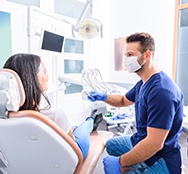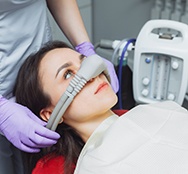Sedation Dentistry– Salt Lake City, UT
A Calm Experience Guaranteed

Patient comfort is one of our highest priorities here at Utah Implants and Periodontics, which is why we offer two forms of sedation dentistry in Salt Lake City, UT. These are proven to stop a racing mind while also preventing a patient from experiencing any physical discomfort during treatment. If you’re anxious about receiving periodontal or dental implant care, please let our team know, and we’ll discuss which of our sedation options would be right for you.
Why Choose Utah Implants and Periodontics for Sedation Dentistry?
- Team Led by One Periodontist
-
Sedation
Certified - Over 200 5-Star Reviews on Google
Oral Conscious Sedation

With this form of sedation, you will start feeling relaxed even before you step into our periodontal office. That is because you will be given medication to take at home on the day of your treatment. By the time you sit in the chair, you will already be sedated, and the appointment should seemingly fly by. You will be conscious throughout the experience, though you may only have fuzzy memories afterward.
What Is Oral Conscious Sedation?

Many patients like oral conscious sedation because it does not require the use of any masks or needles. Rather, all you have to do is swallow a pill shortly before your treatment is scheduled to begin. The sedation usually kicks in within 15 minutes or so. By the time our team starts working on your smile, you should be completely relaxed!
The specific medication used for oral conscious sedation can vary. However, Valium, Ativan, and Halcion are commonly prescribed for this purpose.
How Does Oral Conscious Sedation Work?

Oral conscious sedation is fairly powerful, so you can expect to remain relaxed throughout your appointment. You will not be totally unconscious, but you might drift off to sleep; if you do, it should be easy for our team to awaken you with gentle stimuli.
The effects of the sedation can linger for several hours after your appointment, so it is important that you have a trusted adult ready to drive you home. Once the sedative medication wears off, you may have little to no memory of what happened during your treatment.
Are You a Good Candidate for Oral Conscious Sedation?

You might be a good candidate for oral conscious sedation if:
- You struggle with mild to moderate dental anxiety or fear.
- You have an unusually strong gag reflex.
- You are not easily numbed by local anesthesia.
- You need to undergo particularly complex or lengthy treatment.
- A medical condition makes it difficult for you to sit still for long periods of time.
- You do not have any contraindications that would make oral conscious sedation too risky for you. For example, it is not suitable for individuals with certain respiratory conditions.
Nitrous Oxide Sedation

Do you struggle to get the dental care you need because you experience dental-related anxiety? Maybe your appointments have been uncomfortable in the past because you have a sensitive gag reflex or you experience head/neck/jaw pain. Whatever the case may be, don’t hesitate to ask us about nitrous oxide! This calming solution is suitable for a wide range of patients, and it continues to be so popular because it’s effective, fast-acting, and dissipates quickly. If you are interested in learning more, keep reading or reach out to our Salt Lake City dental team to schedule an appointment.
Who is a Good Candidate for Nitrous Oxide?

Since nitrous oxide is so gentle, it’s a great option for a wide range of patients, including those who need a little help overcoming mild to moderate dental anxiety. Of course, the only way to find out for certain if you’re a candidate is by scheduling an appointment. That way, we can review your medical history, learn about any allergies you have, and determine if nitrous oxide is the best option for you.
Important note: If you are not a candidate because you are pregnant, you are allergic, or you have asthma, don’t worry – we will work with you to find a solution that will ensure you get the dental care you need without the anxiety, stress, and worry.
How Does Nitrous Oxide Work?

First, a small nasal mask is positioned comfortably in place. Then, we will switch on the nitrous and ask you to breathe in the colorless, odorless gas through your nose. After a few breaths, you’ll begin to feel any tension you’re feeling dissipating. By the 10-minute mark, the effects will completely set in, resulting in a light, happy feeling. Throughout your appointment, we will check in with you to ensure you feel calm, comfortable, and at-ease. If we need to adjust the flow of nitrous at any time, we can very easily. Most of the time, patients just relax peacefully in the treatment chair as we work to maintain, restore, or enhance their smiles.
Aftercare for Nitrous Oxide

To ensure the flow of nitrous isn’t disrupted, the mask will stay on throughout the entire appointment. After we’re done providing the care you need, we will remove it, allowing you to breathe in pure oxygen again. It only takes a few minutes for the effects to go away, which enables you to get straight back to your day.
With all of that said, we will provide you with aftercare instructions specific to the treatment you received. For example, if we conducted a deep cleaning, you shouldn’t eat anything until the numbing agent has completely worn off. As always, if you have any questions for us, you can give us a call – we’re here to help!
Sedation Dentistry FAQs
Is sedation dentistry safe?
Typically, sedation dentistry is considered safe but before administering it, our team will first take the time to go over your medical history, including any current medications you may be taking. That way we can avoid any potentially negative interactions. We’ll also monitor your vitals like your blood pressure, oxygen levels, and heart rate to ensure that there are no complications.
Some people suffer from certain conditions that make sedation riskier. For example, if you’re allergic to the medication then we might have to find an alternative. Thankfully, we offer more than one kind, so if you have a known reaction to one of the analgesics, you can still benefit from another type. Also, if you suffer from obstructive sleep apnea, you may not be a good candidate because it can trigger an episode.
How long does dental sedation last?
The impact of your sedation depends on the type that was used for your procedure. Nitrous oxide, or laughing gas, is administered through a mask that’s placed over your nose. Once it’s removed, the effects of the medication typically wear off within the first five minutes. That means you can head back to work, or run your usual errands, without any lingering symptoms.
Oral conscious sedation, however, can last for the remainder of the day following your dental appointment so you’ll need someone to drive you home afterward. You’ll probably feel better after a good night’s sleep, but we recommend avoiding driving or operating heavy machinery for the next 24 hours.
Will I feel any pain with dental sedation?
The medications we use are intended to keep you awake so you’re still conscious and responsive while simultaneously suppressing your body’s ability to register pain. Even if you do experience some sensation, it’ll feel more like pressure than outright aches. Although the sedation itself is often sufficient to keep you feeling calm and happy throughout your procedure, we often also apply a topical anesthetic. This ensures that you don’t experience discomfort either way.
Am I a good candidate for sedation dentistry?
If you’re avoiding our office because of general anxiety around dental visits, you could potentially be a good candidate for sedation. You might also benefit from this medication if you have:
- A low pain threshold. If you don’t tolerate pain well, then sedation can help keep you comfortable and still so we can take care of your teeth and gums.
- A sensitive gag reflex. Having dental instruments near or in your mouth can be triggering, but sedation can soothe your body’s reaction to the intrusion.
- Difficulties sitting still for periods of time. It’s easier for us to work with patients who are still and happy than ones who are frustrated and fidgety.
You might not be able to receive these drugs if you are pregnant, have certain medical conditions, or are taking medications that might interact with the sedatives.
If you’re not sure whether you’re a viable candidate, feel free to contact us and we’d be happy to provide more information and answer any questions you may have.
Periodontal Therapy Dental Implants Surgical Periodontics View Our Services
